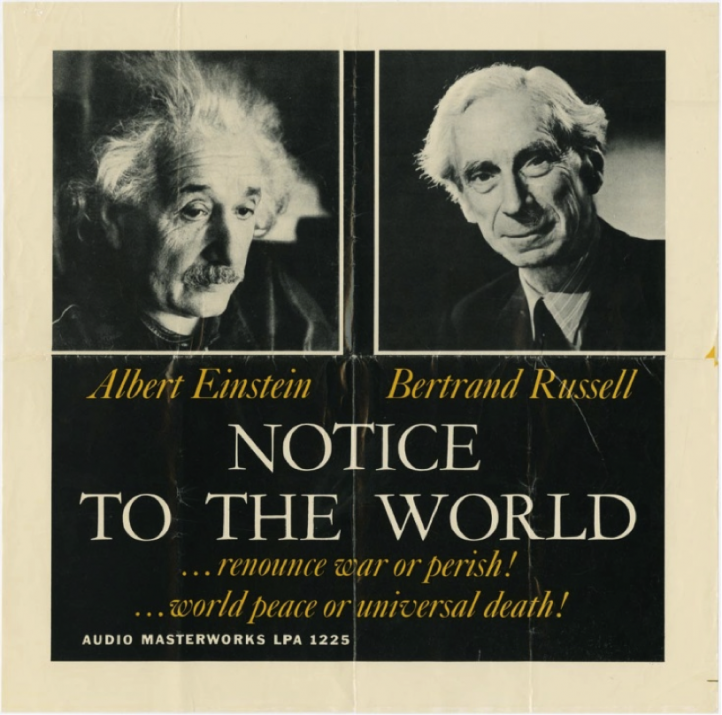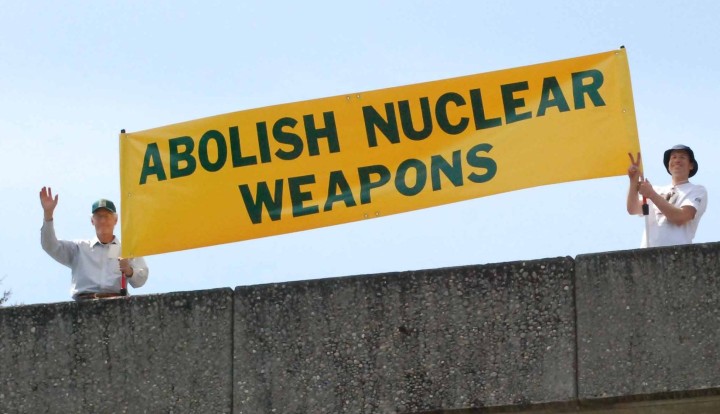Russell-Einstein Manifesto
SPOTLIGHT, 20 Jul 2020
Garry Jacobs and Donato Kiniger-Passigli | Other News - TRANSCEND Media Service
More needed now as it was then
The Manifesto called for the governments of the world to abolish nuclear weapons
13 Jul 2020 – Sixty-five years ago this week, Albert Einstein, Bertrand Russell and nine other Nobel Laureates released a historical document which became known as the Russell-Einstein Manifesto. The Manifesto called for the governments of the world to abolish nuclear weapons in order to eliminate the imminent danger of nuclear warfare and an existential threat to the human race.
The Manifesto did not lead to the eradication of nuclear weapons, but it did generate widespread awareness of the catastrophic dangers of nuclear war. It paved the way for the founding of Pugwash Conferences on Science and World Affairs (1957) and World Academy of Art & Science (1960), the Partial Test Ban Treaty (1963), the Nuclear Non-Proliferation Treaty (1968), and numerous other arms control agreements. It served as inspiration for the growth of the nuclear abolition movement, which reached its peak in the 1980s, led eventually to the elimination of tens of thousands of nuclear warheads at the end of the Cold War, and the award of the Nobel Peace Prize in 1995 to Pugwash and Joseph Rotblat, co-founder of Pugwash and one of the four signatories of the Manifesto who also co-founded WAAS.
The Russell-Einstein Manifesto was the precursor for many successful campaigns run by visionary individuals to promote global peace and wellbeing, such as the land mines eradication campaign that Jody Williams and a small coalition of NGOs managed to bring to highest and universal attention by appealing to the “enlightened self-interest “ of political actors, governments and the public-at-large.
The seriousness of the danger described by the authors of the Manifesto in 1955 mirrors closely the world situation today; only now the sources of the threat, the magnitude and global reach of the danger are many times greater. The scourge of weapons of mass destruction and war still threaten us; but the crises confronting humanity have multiplied exponentially in number, intensity, complexity and impact on human security. The current Pandemic is only the tip of the iceberg. Infectious diseases, hunger and poverty, unemployment and inequality, financial instability and economic uncertainty, the retreat from democracy, the reversion to competitive nationalism, and the overarching threat of climate change loom larger than ever. Together they threaten the stability and wealth of nations, the fortunes of corporations, the lives of citizens, and the livelihoods, freedom, security and wellbeing of all humanity. Some of these challenges discriminate against the poor and underprivileged, minorities, crowded urban or flood-prone coastal inhabitants, but in combination they pose catastrophic threats which even the most powerful and wealthy will find impossible to escape.
At the very moment when leadership is so urgently needed, these challenges are magnified by a vacuum in global leadership and a loss of trust and confidence in national and international institutions – in government, the media, business, science and academia. They have reached a peak at a time when multilateralism is under attack and the international institutions established to prevent world war in 1945 are being threatened and undermined by UN member nation-states.
The various sources of these problems are well-known. Globalization has created a Wild West for multinational corporations to operate outside the borders and boundaries of regulation. Neoliberal economic theory has led to policies that undermine the rights of labor, reduce employment, provide tax cuts to the wealthy and widen inequality. Financialization of the economy has generated a global casino in which the vast proportion of the $360 trillion in global financial resources circles the globe in search of speculative returns rather than being invested in the real economy that creates jobs and provides goods and services to meet real human needs. Democracy has degenerated into plutocracy and been subverted by populism. Large portions of the media have been corporatized or politicized to serve vested interests. The entire global economy is founded on principles and practices that ignore the real value and cost of natural resources, the true price of fossil fuel pollution, and the incalculable risks posed by global warming.
The solutions to most of these global challenges are well-known and well-documented by research. The world possesses all the knowledge, organizational capabilities, technological and financial resources required to address these problems. What has been lacking so far is the power to overcome the ignorance of outdated beliefs, the entrenched power of vested interests, the inertia of bureaucratic procedures and resistance of the privileged for the transition to a more equitable world for all.
The* Russell-Einstein Manifesto* set in motion a long, slow process of evolutionary social change over half a century. Today we do not have the luxury to wait that long to address the challenges confronting humanity. The magnitude and urgency of our situation compel us to seek ways to convert the long, slow, trial and error process of evolution into a rapid, direct process of conscious social transformation.
The World Academy in collaboration with the United Nations in Geneva has embarked on a project in collaboration with a multitude of partner organizations to formulate the process needed for this transformation. Its major component elements are already known. Its goals are set forth in the 17 UN Sustainable Development Goals adopted by 193 nations to attack the causes of violence, war, deprivation and suffering at their roots and provide Human Security for All.
What is needed today are catalytic strategies to generate awareness, mobilize the energies and organized the actions of global society to apply known solutions. That energy cannot and will not come from political leaders at the national level preoccupied with gaining or preserving their own positions. It requires the wisdom and courage of leadership in thought that leads to action. It can only come from forging and unleashing a global social movement of like-minded organizations and individuals dedicated to the common good of all.
Our challenge is to seize on this planetary moment and generate from it the planetary momentum needed to achieve in a few short years what may otherwise take many decades. It happened after World War II when nearly a third of humanity was liberated by the dissolution of colonial empires and the number of independent nation-states doubled in 15 years and tripled in 30. It happened, but far more rapidly, just forty years ago when the sudden fall of the Berlin Wall, the breakup of the USSR, the collapse of communism, the dissolution of the Warsaw Pact, the reunification of Germany, the founding of the European Union, and creation of the Internet as the first truly global social institution transformed a world previously divided by an impenetrable Iron Curtain – events which none foresaw and few believed was likely to happen within fifty year.
These recent events prove that momentous changes are indeed possible in spite of appearances to the contrary. Historical hindsight has rarely proved helpful in anticipating the future. Now it is the time to demonstrate that changes of this magnitude can happen again with greater speed, wisdom, foresight and sincerity than at any time in the past. Even in the midst of the unprecedented threat posed by COVID-19 to the human community, we perceive a growing awareness that such a change is, indeed, possible and within our power to realize.
The Russell-Einstein Manifesto showed the wisdom and power which eleven individuals could release by their initiative. Their words are as relevant today as they were in 1955:
We appeal as human beings to human beings: remember your humanity, and forget the rest.
Today we are called upon to demonstrate the wisdom and power that the progressive forces of humanity can wield by coming together with shared values and common goals to work for the betterment of all humanity.
__________________________________________
Garry Jacobs, President and CEO, World Academy of Art and Science
Donato Kiniger-Passigli, Vice President, The World Academy of Art & Science
Go to Original – other-news.info
Tags: Alamogordo New Mexico, Bertrand Russell, Einstein, Manhattan Project, Nuclear Abolition, Nuclear Arms in Space, Nuclear Ban Treaty, Nuclear Disaster, Nuclear Weapons, Nuclear club, Nuclear war, Pentagon, USA, WMD, WWII
DISCLAIMER: The statements, views and opinions expressed in pieces republished here are solely those of the authors and do not necessarily represent those of TMS. In accordance with title 17 U.S.C. section 107, this material is distributed without profit to those who have expressed a prior interest in receiving the included information for research and educational purposes. TMS has no affiliation whatsoever with the originator of this article nor is TMS endorsed or sponsored by the originator. “GO TO ORIGINAL” links are provided as a convenience to our readers and allow for verification of authenticity. However, as originating pages are often updated by their originating host sites, the versions posted may not match the versions our readers view when clicking the “GO TO ORIGINAL” links. This site contains copyrighted material the use of which has not always been specifically authorized by the copyright owner. We are making such material available in our efforts to advance understanding of environmental, political, human rights, economic, democracy, scientific, and social justice issues, etc. We believe this constitutes a ‘fair use’ of any such copyrighted material as provided for in section 107 of the US Copyright Law. In accordance with Title 17 U.S.C. Section 107, the material on this site is distributed without profit to those who have expressed a prior interest in receiving the included information for research and educational purposes. For more information go to: http://www.law.cornell.edu/uscode/17/107.shtml. If you wish to use copyrighted material from this site for purposes of your own that go beyond ‘fair use’, you must obtain permission from the copyright owner.

